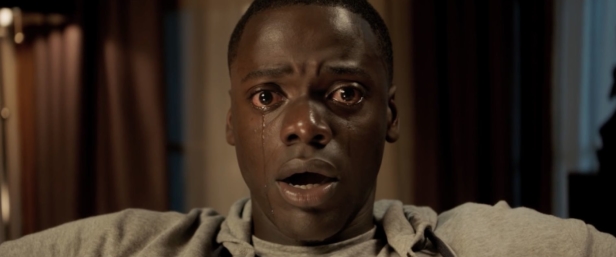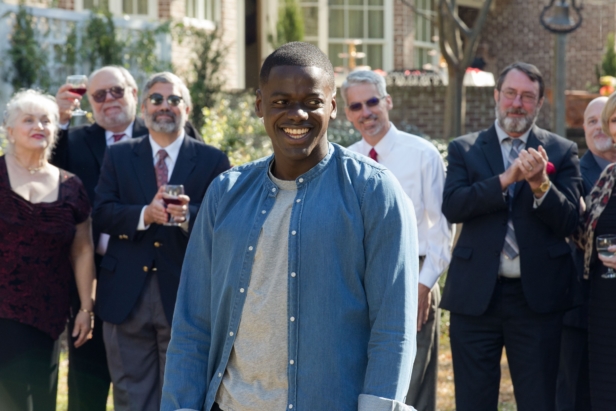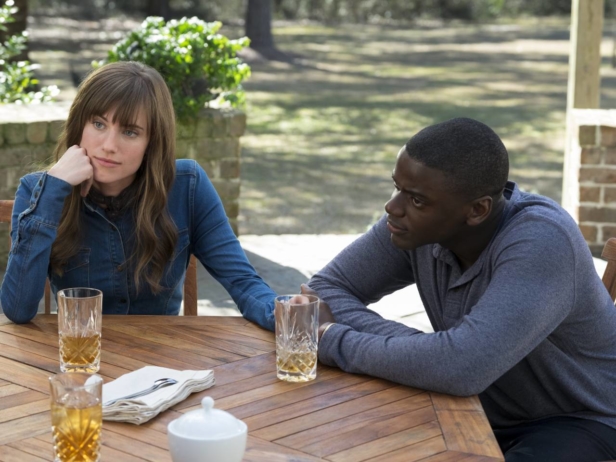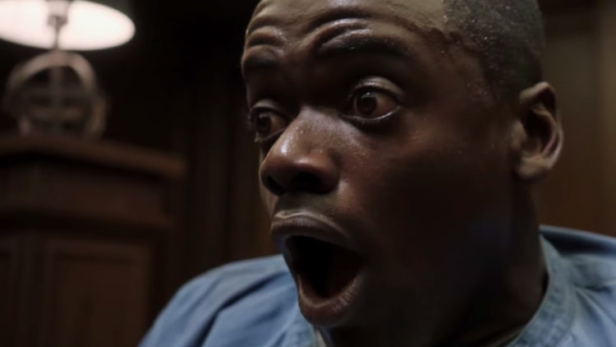Daniel Kaluuya is a very familiar face to British genre fans. He’s starred in cult favourites like Black Mirror, Psychoville and The Fades, as well as appearing in 2015’s excellent (non-genre) thriller Sicario. Now, he’s breaking out with his superb performance as the hero of Jordan Peele’s brilliant smash-hit horror Get Out.
Kaluuya plays Chris, who travels with his girlfriend Rose (Allison Williams) to her parents’ country estate. She assures him that they aren’t racist, but every conversation seems loaded with hints that they’re trying too hard, or that there’s something lurking under the smiles and Jesse Owens photos. Should Chris stay, or should he listen to his instinct to get the hell out?
We talked to Kaluuya about what drew him to the film, working with Peele and how genre films can send a powerful message.
Were you familiar with Jordan Peele’s work beforehand?
Yeah, I watched loads of Key And Peele on YouTube. It’s great. It’s like it’s filling the hole that Chappelle left and I love that social commentary humour.
A lot of those sketches are pretty terrifying, you can tell he loves horror!
Have you seen Baby Forest Whitaker? [laughs]
He showed us that and I was like “Aah, that’s a horror tone!” The thing is, what really resonated with me with Get Out, it tonally reminded me of Steve Pemberton and Reece Shearsmith, the League Of Gentlemen guys. I did Psychoville and it’s that horror and odd humour, I really like that, I think it’s really cool. I think Jordan shares that kindred spirit in a way.
It reminded me of how I felt when I read Psychoville, like, “Ooh, can you say this? Can you do this?” And it was about a subject that I’ve lived and it felt important to me, that all my friends will feel like they belong if they watch a film like this. And so I found that really rewarding, to have a chance to be a part of it.
He definitely knows what he’s doing when it comes to the horror.
Yeah, I think Jordan’s in a great genre sweet spot. You can see it in his sketch comedy and in Keanu, he understands the public and what people want. And he’s a horror fan, he’s a film nerd, and he’s dedicated enough to put the work in. He was working on this script for five years to get it to the standard where it’s going to resonate, and audiences are having a visceral reaction when they watch it.
The conversations in the film are so loaded and they’re incredibly tense to watch. Everything seems to carry meaning…
Sometimes you just have to be on your best behaviour, you want to say something but you know you can’t say something. You just go, “Listen, guys, I’m black and it’s just different.” And sometimes people go “Oh, I don’t see colour.” And I think that’s a bullshit thing. What do you mean you can’t see colour? There’s nuances in every single culture and people aren’t understanding that. But sometimes you go “Oh cool, there’s a time and place.”
And you know that, if you address it, you don’t know how that other person will react. You don’t know how that other person will handle that. They’ll maybe get their back up or they will attack or accuse you of being a racist or XYZ, so you just have to tread that line. I always say, if someone says the word “nigger,” it just fucks you.
It fucks you because every way you react is the wrong way. They put that onto you. If you go crazy, you’re the angry guy. If you fucking stay silent, you’re passive and you’re a coward. If you fucking challenge them then you’re a complication or you’re aggressive, it’s like everything you do is just the wrong thing in their eyes. So it’s really tough navigating that as a black person in western society where people are pretending to be post-racial. People were claiming to be post-racial because of Obama and it’s clearly not what’s happened.
Was that fun as an actor to get in there and play those situations?
It’s just bringing it to life. I’ve been to that party and had those conversations, about people pretending to be OK with this. And they’re nice people, but they’re going out of their way to go “I’m not…I’m cool.” And it’s just “Be cool!” But they’re not cool, because a lot of the time what you say you are is what you aren’t, and that was refreshing because that brings my experience to life.
I loved that recurring bit about Bradley Whitford’s character voting for Obama, does that feel like it plays differently than when you shot the film?
We shot it this time last year, so it was a completely different meaning. That’s what’s great about the film, that’s why Jordan does such great work, because the joke then was just basically, “Oh, I love black people because of Obama.” Now in the current context it’s like, “Yo, I’m not one of those guys.”
And it’s so interesting, when you say something, as time changes the meaning of it changes. And this film is one of those ones, it’s a different film now because Trump’s President.
The whole cast is amazing. What was it like with working with people like Catherine Keener and Bradley Whitford?
It’s an incredible experience because I’ve grown up watching them; it’s quite a surreal experience. And being English and I’m in this film and I’ve watched everyone’s work and I’ve really respected them. And they were so on board with it and had such great ideas. But everyone was really giving, so it was just really cool to be a part of it, in that environment where everyone wants to portray the characters in the best way possible. So it was really rewarding and a rich environment.
It’s Peele’s first time directing a feature and it’s so confident. What was he like to work with?
He’s so open. He’s just so open to your ideas and your outlook and how that’s all going to be. Because there was stuff that I wasn’t comfortable with and he’d be like “Yeah, I get it.” I wanted Chris to be a character that black people would root for, to be frank, and if it wasn’t that, I think the film would fail.
So in a lot of those situations I think Chris had to react in a certain way in order for black people to think, “I’d do the same thing.” He’s doing the best that he can do in that situation. And I think that’s what he really helped me on and was open to listening to me. We improvised a lot because me, Allison and Jordan have improv backgrounds, so if something didn’t feel right, he was willing to chuck things away and start again. He was just really open and really cool.
And I trusted him, that’s the most important thing, I trusted him, so when there were moments when he had to go “You have to trust me,” I said, “OK cool, I do.”
You’ve worked on some of the best British genre shows in recent years, do you find that you’re drawn to this area?
I think the thing with genre is that a lot of times there’s stuff you want to say, and bad storytelling is like “Here’s 4” and good storytelling is “Here’s 2+2.” And I think that’s what genre does, like Black Mirror or The Fades or Psychoville or Get Out, it’s using the genre to say something that’s relevant in this world and then the audience pieces it together.
Because when you come to it, it’s more rewarding, you own that information. And that’s what’s great about Get Out is people are watching it and owning it. I think that’s like the Obama thing. It was just a comment, and now because of what’s happening this year it’s taken this different meaning and people have owned it differently.
I think that’s what sci-fi and horror and comedy allow people to do, is give them space for an issue. Because a lot of people can’t take directness and honesty. It’s a rewarding way of saying something and I think that’s what Jordan does.
Get Out is in UK cinemas now. Read our review here and our interview with Jordan Peele here, and keep up with the latest news with the new issue of SciFiNow.



